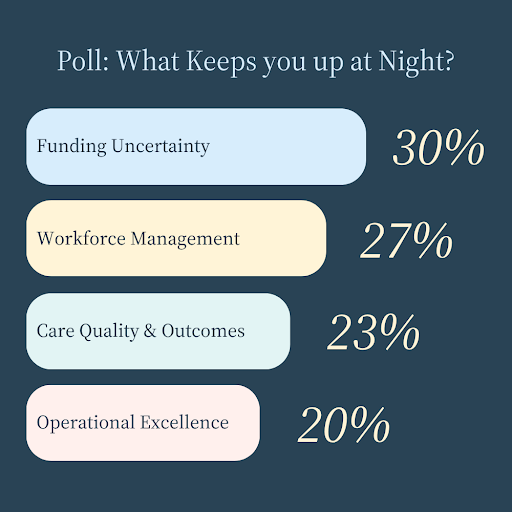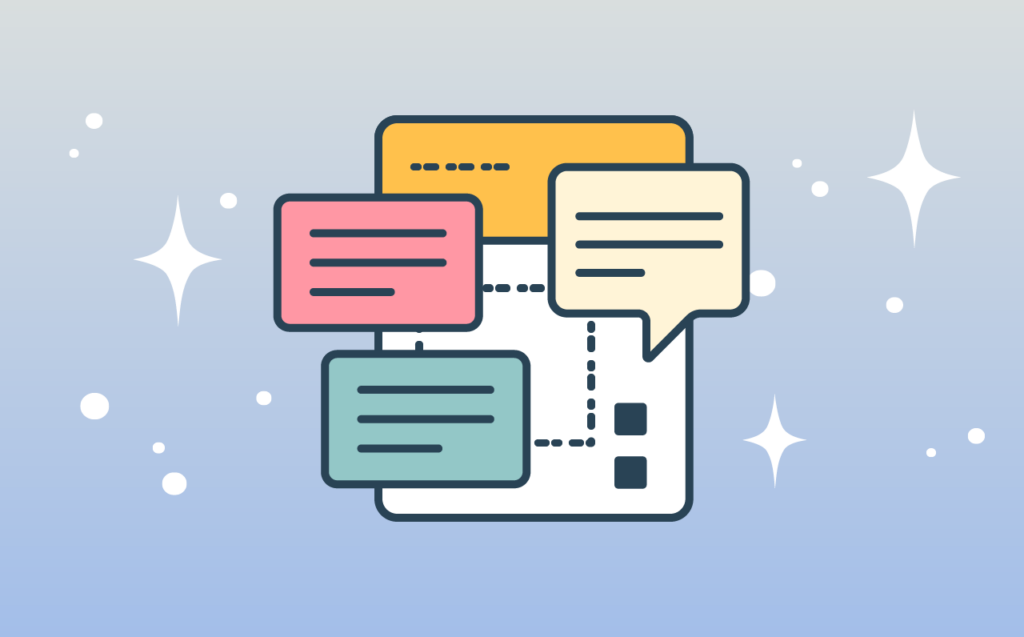In a time of shrinking budgets and soaring demand, Gulf Coast Center CEO Felicia Jeffery is proving that the right AI solution—backed by the right partner—can help behavioral health organizations do more with less, without sacrificing quality or clinician well-being.
Behavioral health leaders are no strangers to operating under pressure. Some might even say they are masters of making lemonade out of proverbial lemons. But 2025 has pushed many organizations—even the most resourceful—to the brink.
On top of ever-mounting documentation demands and workforce shortages that show no signs of letting up, this year has dropped more than its fair share of sour fruit—with the looming Medicaid cuts perhaps the most bitter of them all.
In a recent LinkedIn poll conducted by Eleos, funding uncertainty and workforce management emerged as the top two concerns keeping behavioral health professionals up at night, garnering 30% and 27% of votes, respectively.

On the surface, it might seem like those two challenges are at odds. How can you batten down the financial hatches while also maintaining adequate staffing and provider satisfaction levels? How can you serve more clients with fewer resources? How can you do more with less?
Chaos as a Catalyst for Innovation
According to Eleos CEO Alon Joffe, the answer lies in decisive action paired with smart innovation.
“Every crisis is an opportunity to leapfrog,” Joffe said during a webinar he co-hosted with Felicia Jeffery, CEO of Texas-based Gulf Coast Center. “The mother of all innovation is necessity. When the pressure is up, it’s time to act. That’s what drives excellence for many of us”
Missed the live webinar? Watch the full on-demand recording here.
A Culture Grounded in Care—and Built for Change
When action is designed to spark change, though, culture becomes crucial—and at Gulf Coast, that culture is built on an unwavering commitment to quality care. “We don’t come to work at Gulf Coast Center—we come to care,” Jeffery said.
Jeffery sees herself as the keeper of that culture—a job she takes very seriously. “When I stepped into this role four years ago, we had to figure out our culture, shape the vision, and drive it,” she said. “That meant focusing on financial, operational, and clinical excellence.”
It also meant embracing change.
“When you cut funding, you’re also cutting services,” Jeffery said. “So we had to find ways to keep services on the ground without breaking our people.”
Putting care at the center of every new decision, action, and initiative gives purpose and meaning to the disruption that will inevitably follow, ultimately making the short-term discomfort worthwhile for everyone involved.
This builds resilience, which helps the team at Gulf Coast not only weather the impact of unexpected changes to things like funding or staffing—but also adapt to intentional shifts in internal processes, workflows, or tech systems (like purpose-built AI tools 😉).
Jeffery cited frameworks like Kotter’s Change Model and the Ladder of Accountability to guide her leadership through turbulent times. She also leverages these tools to guide organizational change management (for example, when rolling out new technologies like Eleos).
And that, as Joffe reiterated, is the key to successfully implementing any change—especially an unfamiliar technology like AI—across an enterprise.
“AI is necessary, but if it doesn’t come with change management, and if it doesn’t come with true partnership, then it’s not going to move the needle,” Joffe said.
From Implementation to Impact: Gulf Coast’s Results with Eleos
When Jeffery first brought Eleos to the rest of the leadership team at Gulf Coast, she approached the conversation from a problem-solving angle. While there is certainly pressure to use technology to the fullest—especially when it comes to maximizing organizational efficiency—Jeffery didn’t justify Gulf Coast’s investment in AI that way.
Instead, she positioned it as a solution to longstanding—and expensive—challenges with provider burnout, turnover, administrative burden, and quality assurance.
“When I went to my board, I didn’t promise increased productivity or big dollar savings,” Jeffery said. “I told them we had a workforce shortage, and the top reason was work-life balance. I told them we needed to reduce the stress of documentation, and it was going to cost us. But I knew it would pay off.”
And pay off it did. Gulf Coast’s results with Eleos speak volumes:
- 8x total ROI
- 2,000+ more individuals served
- 7,100+ additional billable services
- $942K in annualized revenue gains
- $1.1M in added audit capacity
- 19% reduction in turnover
- 8,000+ documentation hours saved
What makes these results all the more remarkable is that they weren’t the pitch—just the outcome. The compliance results, in particular, were truly a cherry on top: Eleos Compliance didn’t even exist as a product when Gulf Coast first went looking for an AI partner—and now it’s putting more than a million dollars back into the organization’s budget through cleaner claims, more services captured, fewer clawbacks, and lower personnel costs.
Get the full story on Gulf Coast’s results with Eleos. Read the case study here.
This opens the door for Jeffery to start tackling her next big challenge: offering more competitive compensation packages and opportunities for promotion.
“Now we can audit 100% of notes and only spend time reviewing the ones that need attention,” Jeffery said. “We didn’t cut any positions—we’re just doing more with less. And I’m taking the savings and putting it toward increasing salaries.”
Beyond Dollars and Cents: The VOI Factor
There’s no denying the impact of cold, hard ROI numbers (and in light of the current macroeconomic environment, they were kind of the whole point of this webinar). But, metrics alone don’t always tell the whole value story, because they can’t paint a picture of things like stress relief, morale, job satisfaction, and professional fulfillment. That’s where VOI—or “value on investment”—comes into play.
At Gulf Coast, VOI emerged in the form of clinicians who truly felt like the organization was taking care of them—even as they put all of their energy into caring for others. It was fewer missed coffee breaks or rushed lunches—and less “pajama time” spent catching up on notes after dark. It was being fully present for family dinners and bedtime stories. It was breathing room between sessions and guilt-free time off work.
“We’ve had folks tell us they finally feel like they can take a two-week vacation without dreading what’s waiting when they come back,” Jeffery shared. “People are getting teary-eyed over the time they’ve gotten back.”
Staff morale improved so much that even client feedback reflected the difference. “We just got our latest customer satisfaction scores back,” Jeffery noted. “We’re at 96% for the people who took the survey. And our clinicians are saying they can now see their whole caseload and truly meet their needs.”
That’s the value story that just can’t be told through percentages and dollar amounts. “The cost of turning over an individual is drastic,” Jeffery said, “But what we can’t measure is how it impacts the individuals we serve.”
Partnership Over Product: The Real Key to a Successful AI Rollout
In case it’s not obvious by now, people are really important at Gulf Coast: the people providing the care, the people receiving the care, and even the people who are partners in supporting that care. That’s why, when Jeffery evaluates any potential business partner—including technology vendors—she is evaluating the people above all else. Because for her, partnerships are really more like relationships.
“A partnership doesn’t mean someone gives you a product and walks away,” Jeffery said. “It means they listen to you, help you solve your problems, and walk with you every step of the way.”
Eleos’ responsiveness to the Gulf Coast team’s questions, concerns, ideas, and recommendations was unlike anything Jeffery had ever experienced with a tech partner. “About 50% of our journey has been clinicians saying, ‘What about this?’ and Eleos saying, ‘Let us check into that,’ and then delivering something that exceeds expectations,” she said. “It’s been a beautiful relationship. They worked just as hard as we did.”
Firsthand Tips for Behavioral Health Leaders Embarking on their AI Journey
Jeffery and the team at Gulf Coast were early adopters of behavioral health AI. They were navigating largely unknown terrain, learning and adjusting as they went. And while orgs that are just beginning their AI journey might have some ground to make up, they also have the benefit of learning from those who’ve gone before them.
To that end, Jeffery offered a few golden drops of advice for her fellow executive leaders:
- Treat AI as a strategic business solution, not a gadget or quick-fix.
- Frame the investment around people, culture, and sustainability—not just dollars.
- Be realistic with your board—but remain confident and firm in your belief that AI is now “a cost of doing business” in behavioral health.
- Most of all, don’t wait.
“You can’t be too busy to implement,” Jeffery said. “If you’re serious about keeping your team whole and delivering care at scale, you have to make the time.”
The New AI-Powered Standard for Behavioral Health Operations
Gulf Coast’s results with Eleos are impressive, sure—but they also serve as inspiration. They are a testament to what is possible when leadership, technology, and mission come into alignment to operationalize core values like care, community, and well-being. They demonstrate why it’s so important to put frontline providers at the center of any change initiative—tech-related or not. And they show us that, even in the midst of chaos and upheaval, you can lead with clarity, confidence, and most importantly, compassion.
“This isn’t about squeezing more out of people,” Jeffery said. “It’s about giving them back the time, tools, and trust to do what they do best—care.”
It doesn’t get any sweeter than that. 🍋
Ready to explore what’s possible with Eleos? See how Eleos Documentation and Compliance can support your team’s clinical excellence, operational efficiency, and organizational resilience. Request a demo.

